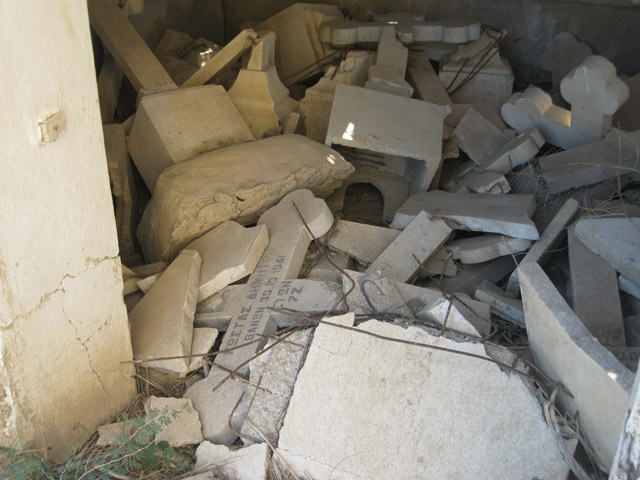Nick Larigakis, president of the American Hellenic Institute (AHI) spoke to the publisher of the Hellenic News of America, Aphrodite Kotrotsios on the occasion of the 46th anniversary of the illegal invasion of Cyprus by Turkey. AHI has been fighting to seek justice for Cyprus ever since its inception. Actually, AHI came to formation as a result of the illegal Turkish invasion of the Republic of Cyprus. It was founded on August 1, 1974, by the late Eugene Rossides. AHI strives to uphold the rule of law and advocates for matters of U.S. foreign policy, concerning affairs pertaining to Greece, Cyprus, and Turkey. AHI is a Greek-American lobbying powerhouse situated near the White House in Washington, DC. Mr. Larigakis shares with us details leading up to the illegal invasion as well the steps AHI took to seek justice. He also stresses the importance of the Greek-American and Cypriot-American communities’ involvement. Together, we can always accomplish much more.
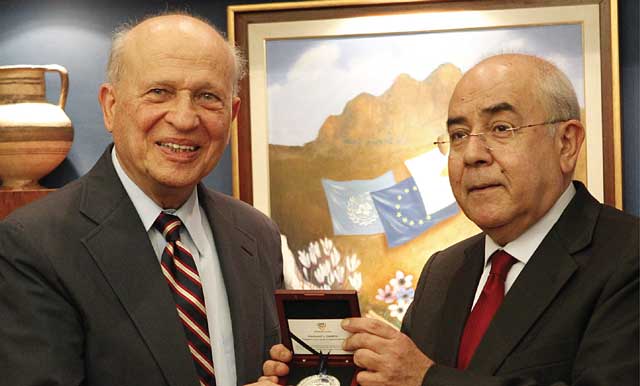
Timeline of events of the illegal invasion of Cyprus by Turkey:
July 15: The Cypriot National Guard and EOKA B, with the support of the Greek Junta, launch a coup with the objective of assassinating and overthrowing the democratically elected President, Archbishop Makarios III, in order to install Nikos Sampson, a supporter of the political ideology of Enosis (incorporation of Cyprus into Greece). President Makarios survives the coup and leaves the country.
July 19: President Makarios addresses the United Nations Security Council and described Greece’s actions as an “invasion” and violation of Cyprus’ sovereignty.
July 20: Taking advantage of the internal instability in Cyprus, Turkey uses the Sampson coup as a pre-text for invading the island.
July 20: Turkish armed forces land at Kyrenia, and successfully beat back a Greek-Cypriot counterattack. The Turkish armed forces, during the ensuing days, successfully build a bridgehead to Nicosia, despite efforts of the Cypriot National Guard.
July 20: The United Nations Security Council passes Resolution 353, demanding immediate withdrawal of foreign troops from Cyprus (unless under the auspices of international agreements) and calls upon Greece, Turkey, and the United Kingdom to formulate a solution to the crisis.
July 22: The Greek government, attempting to salvage the situation, authorizes Operation Niki, and tries to prop up the Sampson government by providing additional resources. However, Greek planes bringing such assistance accidentally receive friendly fire from their Greek allies at Nicosia International Airport, causing significant loss of life.
July 23: Nikos Sampson is removed from office and replaced with Glafkos Clerides. Though a general ceasefire is declared, it is not completely adhered to.
July 23: Due to the unfolding disaster in Cyprus, Greece’s military rulers announced they would turn the nation back to civilian rule. Constantine Karamanlis is brought back from exile and sworn in as Prime Minister. The Ioannides regime is disincorporated.
July 30: The Foreign Ministries of Britain, Greece, and Turkey, issue an official “text of declaration,” call for the temporary secession of hostilities, in order to allow for peace talks, beginning on August 8, 1974, between the respective parties in order to find a resolution
August 2: Despite the text of declaration, there were still intermittent outbreaks of violence. In the “Battle of Kornos Hill,” the Cypriot National Guard defeated an armed Turkish contingency, in an area near Mount Pentadaktylos
August 10: Glafcos Clerides and Rauf Denktaş, the then-Turkish Cypriot leader, meet to discuss the situation on the island, during the Geneva Conference
August 14: Turkish forces begin the “second invasion” of Cyprus, labeled as the “Atilla-II” operation, in violation of the UN ceasefire. This is despite the fact that peace talks, which Turkey agreed to, were ongoing. In the operation, Turkey annexes territory constituting approximately 37% of the island, within a period of two days. This territory would eventually be labeled as the so-called “Turkish Republic of Northern Cyprus,” an area occupied by Turkish troops to this very day.
August 16: The United Nations Security Council adopts Resolution 360, declaring that the “sovereignty, independence and territorial integrity” of the Republic of Cyprus needed to be “respected,” and stating its “disapproval” of Turkey’s second invasion.

Epilogue to Timeline
It is important to note that Secretary of State Henry Kissinger had intelligence available to him that clearly indicated an attempt to overthrow President Makarios by the Greek military junta in conjunction with Cypriot ultra nationalist, Nikos Sampson, was going to occur; and in addition, when it happened, Secretary Kissinger did not immediately come out to condemn it. Further, in a declassified White House memorandum that AHI’s research revealed, Secretary Kissinger is quoted after Turkey invaded Cyprus, “There is no American reason that Turkey should not have one-third of Cyprus.”
In a further condemnation of Kissinger, and the responsibility that then-U.S. policy bears on the tragic events in Cyprus in 1974, British Foreign Secretary James Callaghan got wind that the Turks were about to mount a second invasion while peace talk negotiations were taking place in Geneva. He immediately informed the U.S. representative at the talks, Assistant Secretary for European Affairs Arthur Hartman, and asked him if the “Americans could intervene” to stop Turkey’s second invasion. Hartman stated he could not get the attention of “his boss” Henry Kissinger as documented in the AHI Foundation-produced documentary for PBS, “Cyprus Still Divided: A U.S. Foreign Policy Failure.”
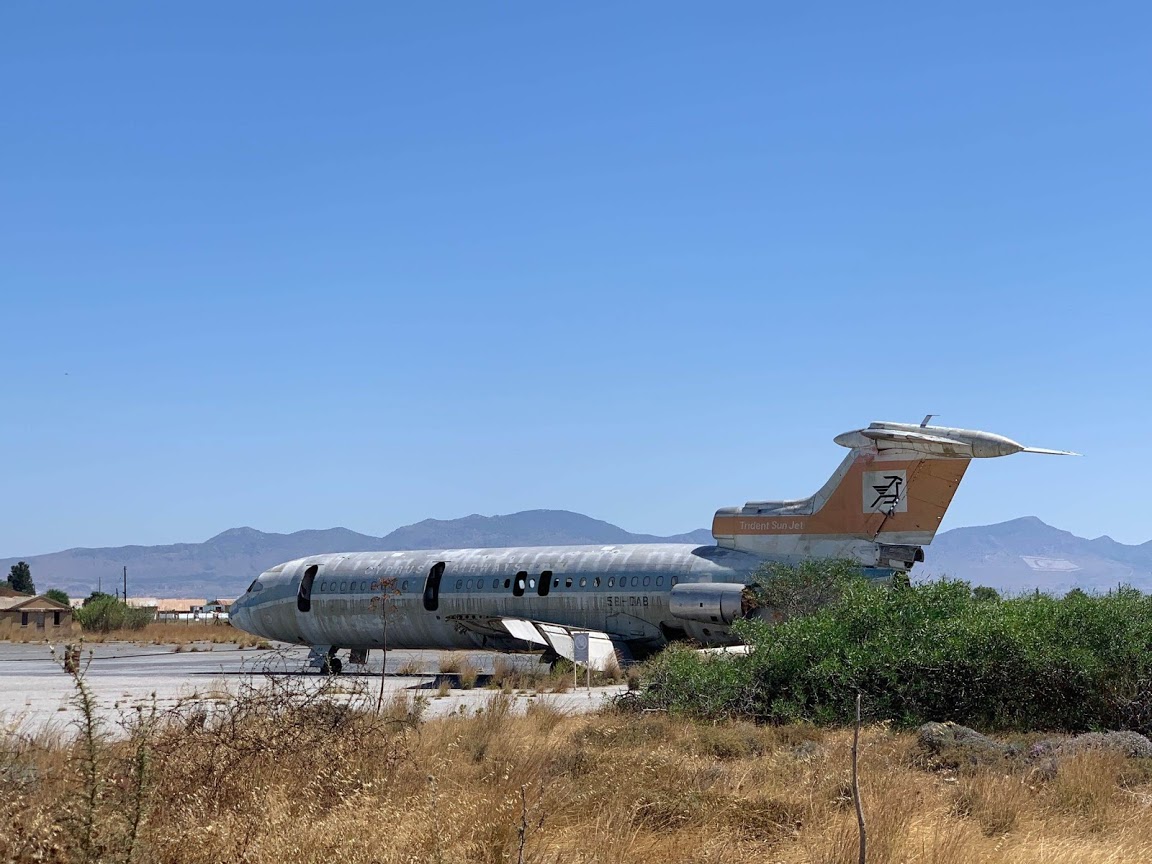
AHI has been at the forefront of seeking justice for the illegal invasion of Cyprus by Turkey since 1974. What steps has AHI taken to seek justice for the people of Cyprus?
First, Gene Rossides founded AHI in 1974 as a direct result of Turkey’s illegal invasion of Cyprus. From its very beginning, AHI was the standard bearer for creating the proper legal argument to force the hand of the U.S. government to act against the illegal action taken by Turkey. Specifically, Rossides framed Turkey’s invasion of the Republic of Cyprus as a “Rule of Law” issue in a letter he wrote to Congressman John Brademas in late August 1974 on the basis of legal violations which affected U.S. political and strategic interests. As a result, this led to the historic passage in the U.S. Congress of the Arms Embargo Rule of Law legislation against Turkey in February 1975.
It was a tremendous victory for the Greek American community and one that should never be underestimated in its significance. Specifically, the maturation of our community in the participation in American political life through advocacy at the grassroots level. Further, it illustrated what we can accomplish when we are all working together for one single legislative goal.
AHI’s initiative to request humanitarian aid for Cyprus to be included in the Arms Embargo legislation held equal importance for its enactment. Many may not recall, but because of the illegal invasion, 180,000 Greek Cypriots became refugees in their own homeland. They were sleeping in tents and deplorable conditions. In testimony, AHI requested $50 million, and ultimately, $25 million was approved. Throughout the years close to $500 million in foreign aid has been provided to Cyprus because of this initiative. This foreign assistance was critical during the early days because it helped to get the people of Cyprus back on the road to recovery.
Obviously, throughout the years, the illegal invasion and subsequent continuing illegal occupation of Cyprus with approximately 42,000 Turkish troops and 200,000 illegal settlers, has been at the center of AHI public policy agenda.
AHI also works to raise awareness about the issue of the Missing – – those individuals whose families have identified as have gone missing following the invasion – and the work of the Committee on Missing Persons to ensure this humanitarian issue is properly addressed and peace can be brought to those families.
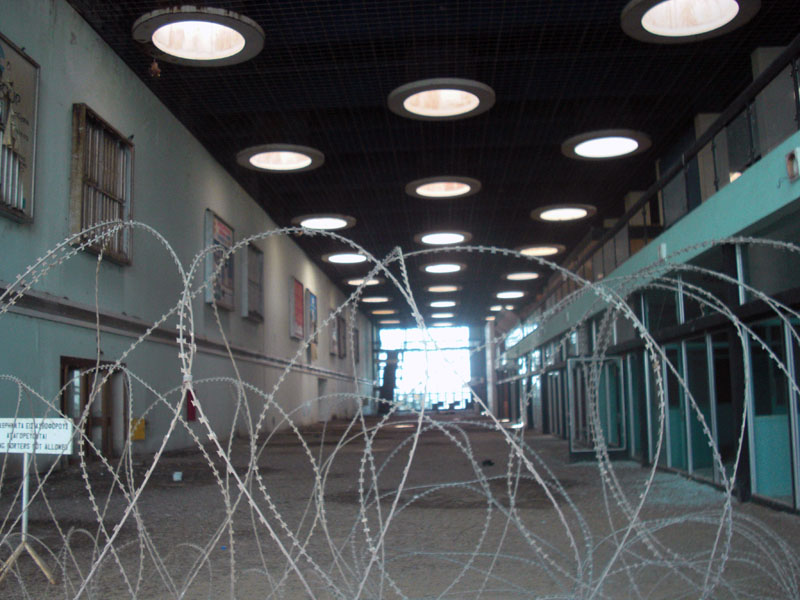
What challenges do we face and how can we overcome them?
The challenges are numerous, especially as it relates to Turkey’s heightened aggression and illegal violations in the exclusive economic zone (EEZ) of Cyprus during the past few years, and due to Turkey’s overall provocative actions in the region. Turkish survey and drill ships have continued to come and go, at will, with only moderate rhetorical reactions from the European Union and the United States. The EU’s sanctions imposed on Turkey are a mere slap on the wrist. In fact, the situation has become so acute that it prompted Cypriot President Nicos Anastasiades to proclaim Turkey’s drilling activities constitute a “second invasion.”
Further, ever since the last round of negotiations to unify the island collapsed in 2017 in Crans-Montana, Switzerland, due to the continuing intransigent actions by the Turkish side, there has been no other attempts to restart the talks. Turkey’s continued insistence on antiquated and obstructive stances, such as the Treaty of Guarantee, which would allow for future unilateral Turkish military interventions and is completely unacceptable and contradicts the governing principals of a European Union member state, must end.
As such, we must continue to remind our policymakers as to these illegal and provocative actions by Turkey against Cyprus, which the U.S. views as a strategic partner, not only violate international law, but also U.S. law under which we sell military weapons to Turkey. Further, these actions by Turkey threaten peace and stability in the Eastern Mediterranean, and by extension the projection of U.S. geostrategic interests, there. This message needs to resonate in all the corridors of the foreign policy establishment of our nation.
To illustrate AHI’s activities, we continue to be in the forefront of educating policymakers via our constant presence on Capitol Hill, whereby we have meetings with Members of Congress and their staff, and other outreach that we have established with State Department Officials. Further, we continue to host conferences, seminars, and webinars that continue to highlight different facets regarding the continuing, now 46-year, illegal occupation of Cyprus. We have also had numerous books published throughout the years that deal with the Cyprus issue.
Another program that has been extremely important in educating our next generation of Greek and Cypriot American leaders, has been our very successful American Hellenic Institute Foundation (AHIF) College Student Foreign Policy trip to Greece and Cyprus. Through this program, now in its 12 years, we have taken over 140 students to Greece and Cyprus. And while many of them had gone to Greece before, literally only 4 had ever visited Cyprus.
This innovative program is building a new generation of leaders, allowing them to understand the complex issues of the Eastern Mediterranean first-hand. The trip is designed to breed advocacy and further study. Participants meet with key stakeholders in both nations. Through these meetings, they very quickly achieve an understanding of the regional dynamics that makes them catalysts for change when they return home to academia and the workplace. In return, we ask all participants to commit time for further study to the Eastern Mediterranean and to help build bridges in the academic world, which helps to shine a brighter light on issues of importance to Greece and Cyprus, and, of course, US interests in the region.
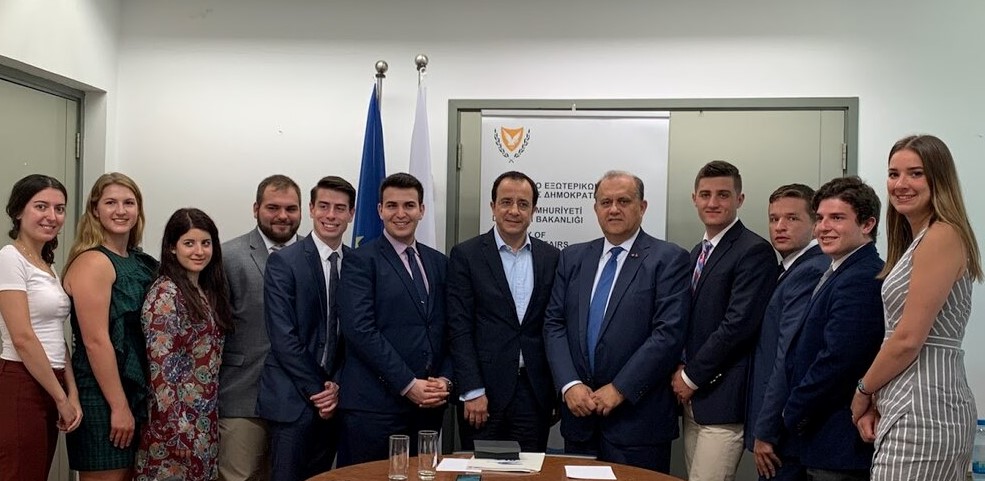
Has the United States been supportive of the Rule of Law in Cyprus?
The Turkish invasion in 1974 and the continued occupation violates the treaties which established the Republic of Cyrus, the UN Charter, the Fourth Geneva Convention, the Universal Declaration of Human Rights, the judgments of the European Court of Human Rights, the US Arms Export Control Act, the US Foreign Assistance Act, the US International Religious Freedom Act, the UNESCO Convention on Protecting Cultural Property, the US Cultural Property Implementation Act and international law.
Over the years since 1974, Congress has passed resolutions, written letters to the Presidents and Secretaries of State and made speeches which exhort successive Administrations to uphold the Rule of Law. Despite the fact that Turkey violates the above referenced laws. No Administration has seriously condemned the numerous violations by Turkey nor acted to impose meaningful penalties for these violations.
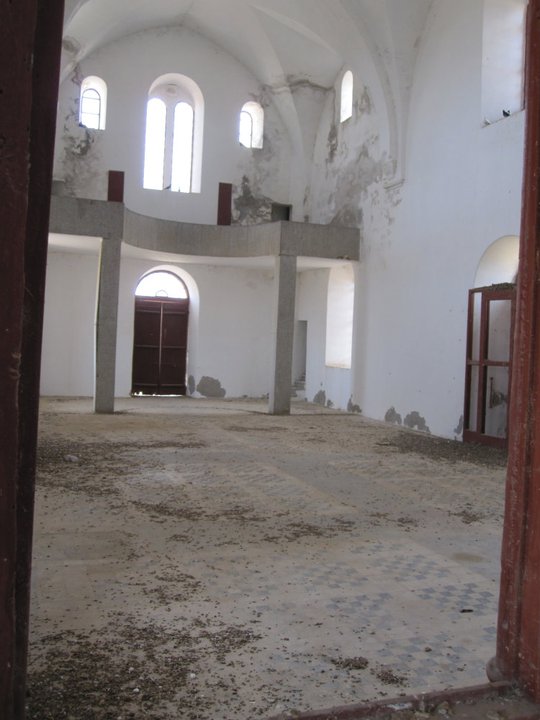
What can we do as U.S. citizens to help achieve justice?
To start, it would be helpful if Greek Americans would care enough about all the issues in the Eastern Mediterranean that threaten Greece and Cyprus as well as U.S. interests. This requires the community to be well-informed and involved at the grassroots level to exercise our constitutional right to petition our lawmakers and make them aware of the issues.
It also means supporting financially, organizations such as AHI and others, who are working fulltime to advocate for these issues in a professional manner. Our arguments have to be anchored in the rule of law, international law, U.S. law, and in the best interest of the United States. And all of us working together… with many voices, but with one message, can once again be successful, as we were in 1974. Failure cannot be an option.




